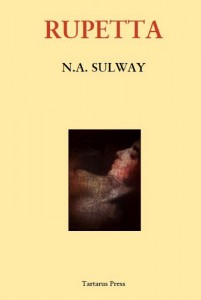N.A. Sulway’s imaginative and highly original novel tells the story of Rupetta, an artificial intelligence created 400 years ago from cloth, leather, and metal, brought to life by the touch of her creator’s hand on her clockwork heart.

Although Rupetta is a constructed being, she is not a robot. Her consciousness is neither digital nor mechanical. Nor is she an android, a creature that is, etymologically, male. (The word is not gyndroid). Rupetta’s power does not come from her brain, but from her heart. Sulway has placed her construct not in the future, but the past, and made her female, created with traditionally feminine technology: sewing and weaving. Rupetta is a woman, made by a woman in the image of a woman, and the world changes to accommodate her existence.
A deft blend of fantasy, science fiction, romance, and even gothic horror, this beautifully written story challenges the reader’s expectations about gender and of a gendering society. It examines power and what makes an object of power, relationships and love, sexuality and identity, and how culture is shaped and history is made.
Rupetta was published by British independent publisher Tartarus Press in a limited hardback edition and a more widely available e-book version. Both are available for purchase from Tartarus’s website.
Nike Sulway lives and writes in Queensland, Australia. Her novel The Bone Flute won the Queensland Premier’s Literary Award for Best Emerging Author in 2000. Since 2007, she has been the co-director of Olvar Wood Writers Retreat, and one of the editors of Perilous Adventures, a literary magazine.
In addition to selecting the winner, the jury chooses a Tiptree Award Honor List. The Honor List is a strong part of the award’s identity and is used by many readers as a recommended reading list for the rest of the year. This year’s Honor List is:
- Eleanor Arnason, Big Mama Stories (Aqueduct Press 2013) — Big Mamas are galaxy-sized women, powerful beings who can stroll around space and travel through time by sheer force of character. They are feminist, sensible, and adventurous. They come in all kinds of colors, and they survive by their wits, sometimes aided and abetted by Big Poppas. In these five stories, Arnason offers a new mythos, laced with both humor and wisdom.
- Aliette de Bodard, Heaven Under Earth (Electric Velocipede #24, Summer 2012) — In a world with few biological women, some men have been medically altered to carry children and live as wives. When a new wife who was born a woman in a household, her presence causes Liang Pao, an altered man, to scrutinize to scrutinize his reasons for wanting to keep the status quo and to re-examine his own sexuality and feelings towards family, culture, status, and gender.
- Nicola Griffith, Hild (Farrar Straus & Giroux 2013) — This stunningly beautiful historical novel describes what life might have been like for a woman whose mother has arranged for her to be “the light of the world”: the real-life St. Hilda of Whitby. In a rollicking good read, the reader is drawn into action and adventure as Hild becomes a king’s seer, a warrior, and a vessel through which the dynamics of power and gender in war-ravaged 7th-century Britain can be explored.
- Alaya Dawn Johnson, The Summer Prince (Arthur A. Levine 2013) — Set in a somewhat dystopic matriarchal future Brazil, this lavish, provocative YA novel centers on June Costa, a rebellious teenage artist. She and her best friend Gil become entwined with Enki, the Summer King, who is elected to a position of celebrity and social eminence for one year before he becomes a ritual sacrifice. This book grapples with the nature of love, social and political conscience, creative rebellion and personal awakening, and an exploration of sexuality remarkable for its treatment of bisexuality and multiple relationships.
- Ann Leckie, Ancillary Justice (Orbit 2013) — This political revenge story draws the reader into a fraught and ruthlessly colonizing military galactic empire. The protagonist is a human being whose consciousness began as a spaceship inhabiting dozens of bodies and vessels. Now stranded in one body, she bides her time and plots against the leader of the culture she once unquestioningly served. The story examines the brutality of occupation as well as exploring questions of gender and embodiment within a cultural framework that does not recognize gender, only class.
- Bennett Madison, September Girls (HarperTeen 2013) — In this young adult fantasy, a young man named Sam spends a summer in a beach town where he encounters numerous Girls with mysterious pasts that even they have a hard time recalling. Exploring the myth of mermaids and gods of the deep through an examination of gendered power dynamics, Sam learns how to become a man in ways that differ from the models he’s been supplied with by his somewhat clueless father, abrasive older brother, and American culture in general.
- Sarah McCarry, All Our Pretty Songs (St. Martin’s 2013) — A modern-day retelling of the myth of Orpheus, this is the story of two teenagers who grew up closer than sisters despite their parents’ drug-fueled rock-star baggage. The girls’ relationship is tested when the mysterious Jack moves to town, along with strange and disturbing otherworldly interest in his musical talent. The lyrical beauty of the writing and the way the story’s concerns support the value of all of the girls’ relationships (not just the romantic ones) make this contemporary myth surprising and affecting.
- Janelle Monae, Electric Lady (Bad Boy Records 2013) — Janelle Monae’s lastest album is a musical work of science fiction, the latest installment in the conceptually rich world of Cindi Mayweather, a prototype android. A cross-medium Afrofuturist fable, loosely inspired by Fritz Lang’s 1927 film Metropolis, Electric Lady has dramatic scope, powered by magnetic waves of sound and rhythm.
- Helene Wecker, The Golem and the Jinni (Harper 2013) — This debut novel combines elements of Jewish and Arab folk mythology in an immigrant tale, the story of two supernatural creatures in 1899 New York. Ahmad is a jinni, a “man” made of fire. Chava is a golem, a “woman” fashioned of clay. A golem is traditionally male. By making Chava a female figure, Wecker expands this well-trod fantasy element. Although she is a powerful and supernatural being, Chava discovers that in 19th-century New York, her choices and freedoms are limited by the gender of the body she inhabits.
- S. M. Wheeler, Sea Change (Tor 2013) — This debut novel tells a dark, fairy tale-like story of a young girl and her best friend, Octavius, who is an eloquent, intelligent kraken. When Octavius is captured, Lilly sets out to rescue him, bargaining with a greedy circus master, a witch, and a pair of gay bandits. She is transformed by her quest, giving up everything she has known, including her gender, to save her friend.
Nike Sulway will be honored during Memorial Day weekend at WisCon in Madison, Wisconsin. Sulway will receive $1000 in prize money, a specially commissioned piece of original artwork, and (as always) chocolate.
Each year, a panel of five jurors selects the Tiptree Award winner. The 2013 jurors were Ellen Klages (chair), Christopher Barzak, Jayna Brown, Nene Ormes, and Gretchen Treu.
